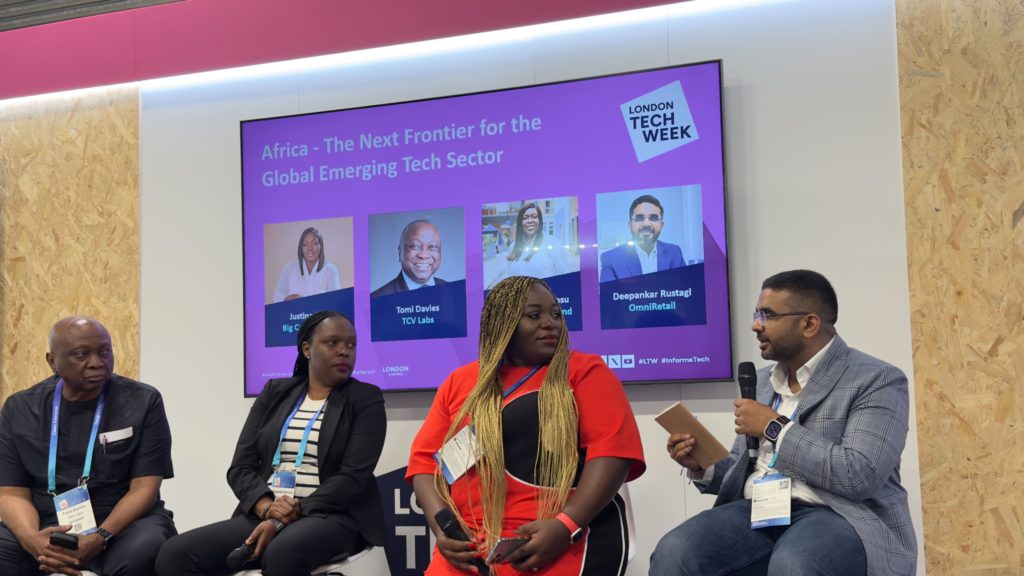
At the London Tech Week this year, attendees were dressed in smart-casual clothes, hundreds of them moving from booth to booth in the exhibition area and hundreds more settled in at panels, showcases, and fireside chats going on on six different stages spread throughout the large dome of the Olympia Events centre in London, UK. Delegations from different countries had booths in the exhibition area—Japan, Switzerland, Nepal, Palestine, Pakistan, and many others. The area held 268 booths of various businesses, but only one of these booths belonged to an African country. The South African Pavilion came to the conference with a packet of 11 startups huddled in its booth. Although many African founders and operators in tech could be seen moving with the crowd, the London Tech Week’s agenda did not have a strong focus on the continent; there was just one event focused on discussing African innovation—“Africa: The Next Frontier for the Global Emerging Tech Sector”.
One would think innovation in the continent is far from exciting. And they would be wrong.
The aforementioned panel was moderated by Justina Oha, partnership consultant at Big Cabal Media; with participation from Yewande Odumosu, managing partner, HoaQ Ventures Fund, an angel investment fund; Tomi Davies, CEO of TVC Labs, a VC providing strategic and operational support to early-stage African tech-enabled ventures; and Deepankar Rustagi, founder and CEO of OmniRetail, a unified consumer goods distribution startup.
The panel discussed the reasons behind unrelenting innovation in Africa, despite the current harsh business climate.
Rustagi, whose OmniRetail was listed by the Financial Times as a fastest-growing company for 2024, said that building for the African market presents opportunities to build for global markets. “In the process of solving one problem, there are various different problems you’ll have to build. When an American startup is building solutions, they follow the trend of a sequoia tree—one single laser focus on the problem—but when a Nigerian is solving a problem, he has to follow the trend of a banyan tree; if you want to solve the problem in Africa, you have to actually build various different startups. And if you, in those scenarios, can build a solution, that’s a very robust, scalable solution that can work anywhere in the world.”
Odumosu believes that innovation continues to happen in Africa because there is an ongoing interaction, through cross-border payments, talent export, and business expansions of startups, between Africans living locally and those living elsewhere in the world. “In the past, you hardly saw a Nigerian company expanding into India or China,” she said. “Now you have LemFi doing that. Also, with a lot of migration happening, we’re also exporting talent. A lot of Africans are now building hubs and businesses locally and in their home countries.”
With generative artificial intelligence (AI) expected to add $4.4 trillion to the global economy annually, according to this McKinsey report, there was an impossible-to-miss enthusiasm about the subject at the London Tech Week; there were 25 panels and fireside chats dedicated to discussing various aspects of the emergence of and innovation around AI.
A presentation delivered before the panel by Olanrewaju Odunowo, head at TechCabal Insights, a data and insights company, revealed a list of African startups across 11 countries deploying AI to solve various problems.
Davies admitted that AI is taking off “aggressively” on the continent and believes that the continent is ready to exploit the technology to solve problems. “AI is being used in diagnostics and telemedicine,” he said. “If you look at agriculture, we’re starting to see AI used in crop maintenance and weather prediction. Now we’re starting to see [electrical] power aggregators who have the capability to use AI to distribute within regions and within locales.”
Davies addressed the current funding downturn—“It’s a blip.” He said that future economic growth will come from Africa, given its teeming youth population. “We’re now waking up and starting to properly educate Africans so that they have the capability to deploy and develop technology,” he said.
from TechCabal https://ift.tt/aQ6dH8o
via IFTTT

Write your views on this post and share it. ConversionConversion EmoticonEmoticon